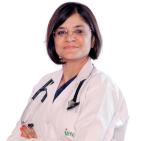
Early Diagnosis & Early Intervention for heart disease in babies
Baby Aahan Patil* (name changed) gurgles and coos while being held in his mother's arms. His 3 month visit at our pediatric cardiac clinic is over. His complete check up shows his heart is healthy and he is growing well. Only a keen observer would make out the faint scar on his chest peeking from under his T shirt: the result of an open heart surgery he had underwent at age 2 days.
The story began before his birth. In the middle of her 2nd trimester of pregnancy, a sonography revealed that the unborn baby had a major heart defect. The couple were referred to us at that time, all the way from the interiors of Maharashtra where they resided. We counselled them, transposition of the great arteries is what the baby has. This is a life threatening condition that will need open heart surgery soon after birth. Once the baby recovers from the surgery, chances are good that his or her quality of life will be as normal as any other child's. The couple understood the situation and planned for the delivery to be in our hospital right where our team would also be. She went into labour near her due date and a 3kg baby boy was born and shifted to the NICU immediately for close monitoring. An echocardiogram on the baby confirmed the diagnosis and 2 days later, he underwent successful open heart surgery: the Arterial Switch Operation. His recovery was rapid and he was discharged home to happy parents in 12 days.
About 1 in 100 children have heart disease. Unlike the adults, children's heart disease is because the heart did not develop in the normal manner when the baby was inside the mother, in the first 2 months of pregnancy.
It is important to diagnose heart disease in children as soon as possible. An undiagnosed heart defect can be life threatening or progress and become inoperable after some months to years depending on the kind of defect. Also an uncorrected defect stunts the child's growth in many different ways.
The earliest a heart defect can be picked up is by an ultrasound done before birth, ideally at 18-22weeks of pregnancy. This is called fetal echo' and is similar to the routine ultrasound done on pregnant women except that the pediatric cardiologist zooms in on the heart and its vessels. After birth, the child's doctor may suspect heart disease if the baby has poor feeding skills, slow weight gain or repeated chest infections. The doctor may also suspect heart disease if an extra heart sound is heard or the baby's color is abnormal.
Early diagnosis of heart defects in children should be followed up by early intervention. The intervention may be an open heart surgery, a procedure in the catheterization laboratory or medicines and close follow-up as appropriate. A center with a dedicated team of specialists in child heart care can best make the decision of the correct intervention required.
Dr Swati Garekar
American Board Certified (peds cardiology)
Consultant Pediatric Cardiologist
Dr Dhananjay Malankar
MS, MCh
Head, Pediatric Cardiovascular Surgery
Categories
Clear allMeet the doctor

- Paediatrics | Paediatric Cardiac Sciences
-
15 Years
-
2000









